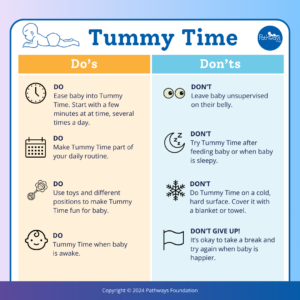Newborns should do tummy time for about 15 to 30 minutes daily. Start with short sessions, increasing as they grow stronger.
Tummy time is essential for your newborn’s development. It helps build their neck, shoulder, and back muscles. These muscles are crucial for milestones like crawling and sitting. Start tummy time as soon as your baby comes home. Aim for short sessions, about 3 to 5 minutes at a time.
You can gradually increase the duration as your baby gets used to it. Make tummy time enjoyable by placing toys in front of them. This can encourage them to lift their head and look around. Remember, always supervise your baby during tummy time to ensure their safety.
Table of Contents
Introduction To Tummy Time
Tummy time is essential for newborns. This practice helps strengthen their neck and shoulder muscles. It also promotes better motor skills and coordination. Babies who enjoy tummy time often learn to roll over and crawl sooner.
Benefits of tummy time include reducing the risk of flat head syndrome. It encourages visual and sensory development as babies explore their surroundings. This activity can also improve digestion and help with gas relief.
Newborns should have tummy time for a few minutes daily. Gradually increase the time as they grow stronger. Always supervise your baby during tummy time for safety.

Credit: www.thebump.com
Starting Tummy Time
Starting tummy time is important for a newborn’s development. Begin tummy time around 2 to 3 weeks of age. This helps strengthen neck and shoulder muscles. Early sessions should last 3 to 5 minutes. Gradually increase the time as your baby gets used to it.
Choose a safe, flat surface for tummy time. Always supervise your baby during this activity. Make it fun by getting down on the floor too. Use toys to keep your baby engaged. Regular tummy time helps prevent flat spots on the head.
| Age | Duration |
|---|---|
| 2 to 3 weeks | 3 to 5 minutes |
| 1 month | 5 to 10 minutes |
| 2 to 3 months | 10 to 15 minutes |
Frequency And Duration
Newborns should have tummy time every day. Aim for about 30 minutes total. This time can be broken into smaller sessions. Start with 3 to 5 minutes at a time. Increase it as the baby gets stronger.
Watch for signs to increase tummy time. If your baby enjoys it, add more minutes. Smiling, cooing, or reaching for toys are great signs. If the baby gets fussy, take a break. Always keep it a fun experience.
| Age | Daily Tummy Time |
|---|---|
| 0-2 months | 15-30 minutes |
| 2-4 months | 30-60 minutes |
| 4-6 months | 1 hour or more |
Creating A Safe Environment
Creating a safe environment is key for tummy time. Choose a flat surface that is firm. Avoid soft surfaces like couches or beds. These can be unsafe for your baby.
Use a play mat or a blanket on the floor. Make sure the area is clean and free of sharp objects. Always supervise your baby during tummy time. This ensures they are safe and comfortable.
Ensure the room is well-lit so you can see your baby clearly. Keep the temperature comfortable. Babies can get too hot or cold easily.
Monitoring Your Newborn’s Progress
Monitoring your newborn’s development is essential. Tummy time helps strengthen their muscles. Watch for key milestones during this time. Your baby should lift their head by 2 months. By 4 months, they may push up on their arms. Sitting with support usually happens around 6 months.
Consult a pediatrician if your baby struggles with tummy time. Lack of head lifting by 3 months is a concern. If your baby seems excessively fussy during tummy time, seek advice. Not meeting milestones can indicate developmental issues.
Incorporating Tummy Time Into Routine
Incorporating tummy time into a newborn’s routine is essential for development. After feeding, wait a bit before starting tummy time. This helps prevent any discomfort or spitting up. Aim for short sessions of 3 to 5 minutes at first. Gradually increase the time as your baby gets stronger.
Choose a soft, safe surface for tummy time. Use a blanket or play mat. Keep the baby engaged with toys during these sessions. Face-to-face interaction can make tummy time fun. Babies may enjoy seeing their parents’ smiles and hearing their voices.
| Activity | Recommended Time |
|---|---|
| Tummy Time | 3-5 minutes |
| Playtime | As desired |
Engaging Your Newborn
Engaging your newborn during tummy time is essential for their development. Use colorful toys to catch their attention. Soft props like cushions can make tummy time more comfortable. Consider placing a mirror in front of them. Babies love to see their own reflection.
Try using rattles or crinkly toys to encourage movement. This helps develop their motor skills. Songs or gentle voices can also keep them engaged. Create a fun environment to make tummy time enjoyable.
| Type of Toy | Benefits |
|---|---|
| Colorful Toys | Attracts attention and stimulates vision |
| Mirrors | Encourages head lifting and visual tracking |
| Rattles | Stimulates grasping and reaching movements |
| Soft Cushions | Provides comfort and support |
:max_bytes(150000):strip_icc()/VWH-DanieDrankwalter-TummyTime-Standard-4842ee7d3e0941fabcf567120cc4706b.jpg)
Credit: www.verywellhealth.com
Common Challenges
Fussiness during tummy time is common for many newborns. Babies may cry or resist lying on their stomachs. This reaction can be frustrating for parents. Try to make tummy time fun and engaging.
Use toys to grab their attention. Placing a mirror in front of them can be exciting. Singing songs or talking can also help soothe them.
For resistant babies, alternative positions can help. Hold your baby against your chest. This provides comfort and allows them to strengthen their neck muscles.
Side-lying can also be a good option. Place your baby on their side with support. This position encourages movement and play.
Tummy Time For Premature Babies
Premature babies need special care during tummy time. Adjusting tummy time recommendations is essential. Start with short sessions, about 3-5 minutes. Gradually increase the time as the baby grows stronger. Aim for 2-3 times a day.
Extra precautions for preemies include monitoring their comfort level. Always supervise tummy time closely. Use a soft surface to support their delicate bodies. If the baby seems tired or fussy, it’s okay to stop.
Consult with a pediatrician for personalized advice. Every baby is unique, and their needs may vary. Following these guidelines helps promote strength and development.
Building Strength And Skills
Tummy time is crucial for a newborn’s physical development. It helps build strong muscles in the neck, back, and shoulders. This activity encourages babies to lift their heads and push up with their arms. Regular tummy time also aids in developing motor skills. Starting tummy time early can set a strong foundation for future movements.
There are also cognitive benefits from tummy time. Babies learn to explore their surroundings while on their stomachs. This exploration enhances their visual and spatial awareness. It helps them understand how to move their bodies. Engaging with toys during tummy time can boost their curiosity and problem-solving skills.
Parental Involvement
Parents play a crucial role during tummy time. They can make it a fun experience. Engaging with your baby fosters strong bonding opportunities. Use toys to capture their attention. Make silly faces or talk to them. This creates a positive association with tummy time.
Spending time on the floor together helps develop trust. Holding your baby’s gaze while they practice strengthens your connection. Encourage them with gentle encouragement and praise. Each session helps build their muscle strength. This is important for future milestones.
Tummy Time Variations
Try different positions for tummy time to keep it fun. Lay your baby on their tummy on a soft surface. Hold their hands or use a toy to encourage them to lift their head. Place a rolled towel under their chest for support. This helps strengthen their neck and back.
Incorporate tummy time into daily activities. Place your baby on their tummy during playtime. Use a play mat with colorful toys to grab their attention. Do tummy time after diaper changes or naps. Short sessions throughout the day are effective.
Make it a routine. Aim for two to three sessions each day. Start with a few minutes and gradually increase the time. This will help your baby enjoy tummy time and develop important skills.
When To Transition Out Of Tummy Time
Recognizing signs that your baby is ready to move on is key. Look for increased strength in their neck and back. Your baby may start to push up on their arms during tummy time. Another sign is when they can roll over easily from tummy to back.
Watch for curiosity about their surroundings. Babies may try to reach for toys while on their stomach. When they begin to rock back and forth, they are preparing to crawl. This is a great time to support them in sitting up.
Encouraging these movements helps develop muscle strength and coordination. Always supervise your baby during these activities for safety.

Credit: pathways.org
Tips For Success
Establish a consistent schedule for tummy time. Aim for short sessions, about 3 to 5 minutes each. Gradually increase the time as your baby grows stronger. Try tummy time two to three times a day. Make it a fun experience with toys or your voice.
Stay patient and encourage your baby. Some infants may fuss at first. Reassure them with gentle touches and smiles. Celebrate every small achievement during tummy time. This practice helps strengthen their neck and shoulder muscles.
Frequently Asked Questions
How Long Should Tummy Time Be For Newborns?
Newborns should have tummy time for about 10-15 minutes daily, broken into shorter sessions.
What Age Do Babies Start Tummy Time?
Start tummy time as early as 2 weeks old to help develop neck and shoulder muscles.
How Can I Encourage Tummy Time?
Use colorful toys or a mirror to make tummy time engaging and fun for your baby.
What If My Baby Hates Tummy Time?
If your baby dislikes tummy time, try shorter sessions or different positions to make it more comfortable.
Can Tummy Time Help With Flat Head Syndrome?
Yes, tummy time can reduce the risk of flat head syndrome by promoting varied head positions.
Conclusion
Tummy time is essential for your newborn’s development. Start with short sessions each day. Gradually increase the time as your baby grows stronger. Always supervise your little one during tummy time. This helps build muscles and coordination. Make it fun and engaging for them.
Enjoy these special moments together!






